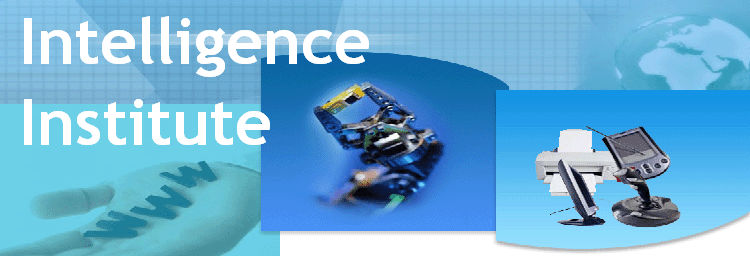|
Artificial Intelligence LINKS
These are links to the topics of the course and the larger fields to which they belong —artificial intelligence, cognitive science, neuroscience, and philosophy of mind.
· The Agent Society
· AI, Cognitive Science, and Robotics. Large collection of links. From Stephanie Warrick.
· ~~AI on the Web. From Stuart Russell and Peter Norvig. A very large collection of links. Part of the web supplement to their popular AI textbook.
· AI-Related FAQs. From Mark Kantrowitz.
· AI Repositories and Resource Lists. From Carnegie-Mellon University. Extensive.
· ~~AI, VR, Alife Resources. From Alexander Chislenko. Links on artificial intelligence, virtual reality, and artificial life.
· American Association for Artificial Intelligence
· The Ants: A Community of Microrobots. From James McLurkin.
· ~~The Applied AI Reference Tree of Knowledge. A user-built tree of AI topics and references.
· Artificial Intelligence. From Jonathan Bowen.
· Artificial Intelligence. Well-organized collection of links. From Yossi Mamroud.
· Artificial Intelligence Center. At the Stanford Research Institute.
· Artificial Intelligence FAQ's. From the Institute for Information Technology.
· ~~Artificial Intelligence Information. From Terry H. and Knowledge Technology.
· Artificial Intelligence in Medicine Web Resources. From Philip Davis.
· Artificial Intelligence Links.
· Artificial Intelligence Resources. From the Institute for Information Technology. Very comprehensive set of links.
· Artificial Intelligence Societies and Organizations Directory
· Artificial Intelligence Resources. From the Institute for Information Technology. A very good collection of links.
· Artificial Life "Games" Page. From Luigi Pagliarini and others.
· Artificial Life Online. From MIT Press.
· Association for the Scientific Study of Consciousness
· Automated Reasoning Project. From the Australian National University.
· The Brain Project. From Stephen Jones.
· Can Machines Think? Graphical maps of the major positions and arguments from MacroVU. This is the web site for the maps I've been posting in the philosophy foyer during the course.
· Center for Research on Concepts and Cognition. Douglas Hofstadter's research group at Indiana University.
· The Cog Shop. On Cog, a robot being built at MIT.
· Cognitive and Psychological Sciences on the Internet. From Scott Mainwaring.
· ~~Cognitive Science Dictionary. From Michael Dawson and David Medler.
· Cognitive Science Links. From Links2Go.
· Cognitive Science Links. From the York University Department of Science and Technology Studies.
· ~~The Cognitive Science Society
· Complexity and Artificial Life. From Chris Lucas and CALResCo.
· Computational NeuroEngineering Lab. University of Florida.
· Computing Research Repository. Co-sponsored by the Association for Computing Machinery, the Los Alamos E-print Archive, and the Networked Computer Science Technical Reference Library. Searchable.
· ~~Consciousness. Links and resources. From David Chalmers.
· ~~Consciousness and the Brain: Annotated Bibliography. By Ralph Ellis and Natika Newton.
· Consciousness Studies. Links and resources. From Stephen Jones.
· Constructions of the Mind: Artificial Intelligence and the Humanities. A special issue of the Stanford Humanities Review.
· ~~Contemporary Philosophy of Mind: An Annotated Bibliography. From David Chalmers. Jump to section on ~~philosophy of AI.
· CYC home page. From Cycorp.
· ~~CYC FAQ. From David Whitten.
· ~~Reflections on CYC. By Jorn Barger, author of ~~The Robot Wisdom Pages.
· ~~Daniel Dennett
· ~~Dictionary of the Philosophy of Mind. Compiled by Chris Eliasmith. Also contains a ~~link page.
· The Distributed Artificial Intelligence Laboratory. At the University of Massachusetts.
· Ecology of Mind. From Vincent Kelly.
· Encyclopedia of Neuroscience. Not the full-text but some content to supplement the print edition.
· Epistemology, Consciousness, and the Mind. From the Sputnik Drug Information Zone. A good collection of links.
· A Field Guide to the Philosophy of Mind. From Marco Nani and Massimo Marraffa.
· Foundation for Neural Networks. Headquartered in Holland.
· Free Online Dictionary of Computing
· ~~The Game AI Page. From Steven Woodcock.
· ~~Glossary of the Philosophy of Mind. From Darren Brierton.
· ~~A Guide to Artificial Intelligence and Law Resources. From Michael Aikenhead.
· Intelligent Software Agents. From Sverker Janson.
· International Neural Network Society
· International Society of Applied Intelligence
· Internet Softbot Research
· The Life Artificial Life Page
· Mind and Body, From Descartes to William James. From Robert Wozniak.
· Mind/Brain Resources. Very good set of links. From Valerie Gray Hardcastle.
· Mind Uploading Page. From Joe Strout.
· MIT Artificial Intelligence Laboratory
· MIT Encyclopedia of Cognitive Science. Requires registration ("subscription"), at no charge.
· MIT LCS/AI Reading Room Catalog. Searchable catalog of AI literature at MIT.
· The Natural Language Software Registry
· Net Culture Artificial Life & Intelligence Archive. From The Electronic Frontier Foundation.
· Neural Information Processing Systems. At Carnegie Mellon University.
· Neural Network FAQ
· ~~Neural Networks. From Z Solutions in Atlanta.
· Neural Networks Council. From the Institute of Electrical and Electronics Engineers (IEEE).
· ~~Neuron Emulation List. Ways to emulate neurons in hardware and software.
· NEuroNet. From Chris Hinton.
· ~~Neuroscience for Kids. From Eric Chudler.
· Neurosciences on the Internet. From Neil Busis.
· Non-Cartesian Cognitive Science
· Online Center for the Cognitive Science of Metaphor. University of Oregon.
· ~~Online Papers on Consciousness. Collected by David Chalmers. Jump to the papers on the ~~philosophy of AI, on the ~~Turing Test, or on the ~~Chinese Room.
· Other courses like this one.
· Minds and Machines. By Ned Block at New York University.
· Minds and Machines. By Alex Byrne at MIT.
· ~~Minds and Machines. By Varol Akman, Bilkent University (Ankara, Turkey).
· ~~Philosophical Foundations of Artificial Intelligence. By Varol Akman, Bilkent University (Ankara, Turkey).
· ~~Philosophy of Artificial Intelligence. From Selmer Bringsjord.
· Philosophy of Mind. By Murat Aydede at the University of Chicago.
· ~~Philosophy of Mind. By Curtis Brown at Trinity University.
· ~~The Outsider's Guide to Artificial Intelligence. From Jorn Barger, author of ~~The Robot Wisdom Pages.
· ~~Philosophy and AI: Annotated Bibliography. From Brian Rosmaita.
· ~~Philosophy and the Neurosciences Online Resources. From Pete Mandik.
· A Philosophy of Artificial Life Bibliography. By Brian Keeley.
· ~~Philosophy of Mind and Cognitive Science Page. From Alan Laser.
· Philosophy of Mind and Cognitive Science. From Joe Lau.
· The Pre-History of Cognitive Science. From Carl Stahmer.
· The Principia Cybernetica Project. Using systems science and cybernetics to answer philosophical questions.
· Sante Fe Institute
· SIGART. The special interest group (SIG) on artificial intelligence (ART) from the Association for Computing Machinery. Has an excellent page of links.
· ~~Some Philosophy and AI Material. From Derrin Arnett.
· ~~Thoughts on Emergence. By David Chalmers.
· Turing Test competitions in real-life.
· BBC Turing Test. Also see the invitation in the press, and the summary.
· The Loebner Prize Competition. Also see Michael Mauldin's paper on the Loebner Competition, which includes some interesting detail and transcripts. Also see the 1994 winner Thom Whalen's How I Lost the [1995] Contest and Re-Evaluated Humanity.
· Turing Test 1998. From FringeWare, Inc.
· ~~The Turing Test Homepage. From Pinar Saygin and Varol Akman.
· Useful Links for Cognitive Sciences. From Wlodek Duch. A large list of links.
· WWW Resources in Cognitive Science and Philosophy of Mind. From Joe Lau. A good collection of links.
· Zombies Invade Philosophy. Papers and links on zombies by Larry Hauser.
· ~~Zombies on the Web. Links and thoughts on zombies by David Chalmers.
|




